From product endorsements to affiliate marketing, there are countless ways to use influencer marketing campaigns to promote your business. Not only can they help bring in sales and brand engagement, influencer campaigns are also cost-effective and highly relevant in this day and age.
To help you, we’ve listed five types of affordable influencer marketing campaigns that can both minimize risk and bring growth.
1. Get Expert Product Reviews & Endorsements
Finding influencers whose expertise aligns with your industry and niche allows you to reach a targeted audience that’s already engaging with similar content. At the same time, plenty of these influencers are seen as trusted sources of information. A 2023 Matter Survey on influencer marketing reveals that 69% of consumers are likely to trust influencers’ recommendations over information coming from a brand.
When an influencer relevant to your niche endorses your product or posts a positive review, it positions your brand favorably and often produces immediate sales. For example, PlayStation partnered with influencers from the gaming industry to endorse their new product for virtual reality headsets. It had influencers post content to bolster its social media marketing efforts, tapping into the influencer’s current following.
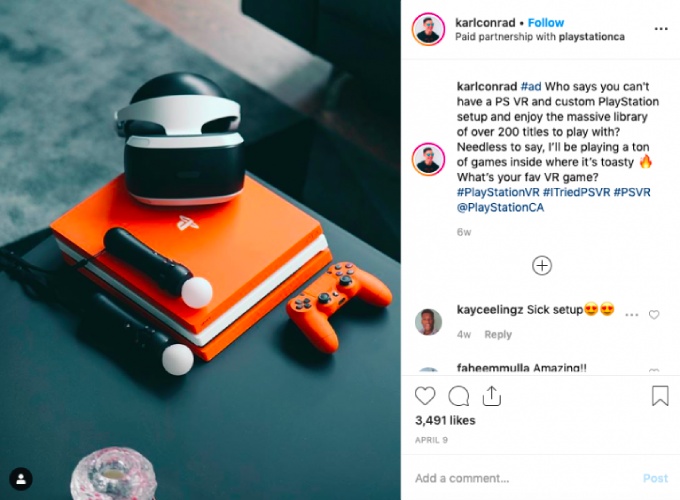
Brands partner with influencers to have them endorse their products.
(Source: No Good)
Once you find the right influencers for your brand, you can either partner with them to endorse your product or use an influencer marketing strategy called “product seeding.” Product seeding is basically sending your product to influencers as a gift, hoping they will mention it to their audience or leave a positive review.
2. Connect With Authentic Brand Narratives & Values
In Gitnux’s Brand Authenticity Statistics Report for 2023, 86% of consumers said brand authenticity is a key factor in deciding which brands they like and support. Expressing the core values that your business and its audience share as a narrative is an influencer strategy that allows brands to be perceived as more authentic. In fact, almost half of the survey’s respondents said they see authenticity in brand marketing that shows “real people.”
To incorporate this strategy in your social media plan, make sure the influencer you’re partnering with knows how your brand came to be and what it represents. Be transparent about your brand’s core values and the causes or advocacies that are important to your brand.
For example, Magnum Ice Cream’s marketing campaign with singer-songwriter, activist, and influencer Halsey focuses on their advocacy for Black creators. Magnum pledged to the Black Creators Funding Initiative (BCFI) and other similar organizations while Halsey produced content for the brand under the hashtag #TruetoPleasure.
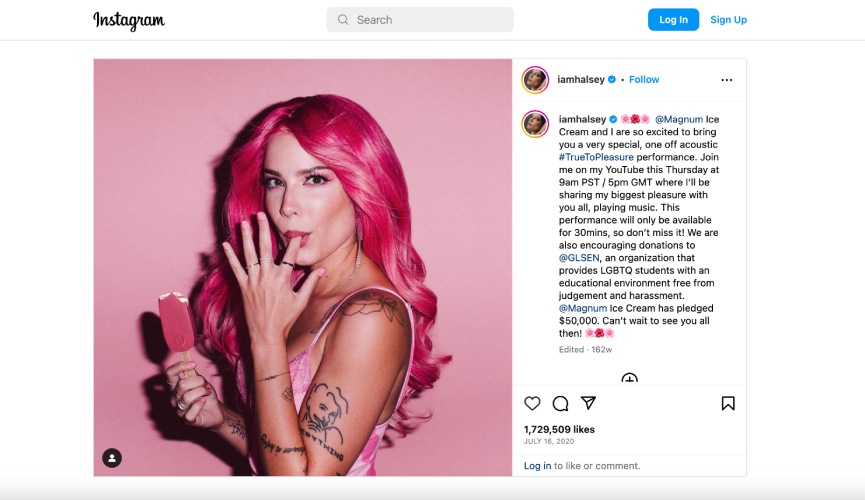
Influencer marketing brings authenticity to a brand by showing its values. (Source: Instagram)
Being transparent and authentic with your brand can bring loyal customers. Partner this with influencer campaigns, and you can amplify your brand’s voice in ways that traditional marketing cannot do.
3. Stretch Your Budget With Micro-influencer Marketing Campaigns
Influencer marketing is not just for corporations with large marketing budgets. The beauty of it is the number of factors that can help bring down costs (like their number of followers or the platform they use) without sacrificing the quality of your marketing campaign. For example, some TikTok influencers with less than 10,000 followers charge as little as $5 per post. These small-scale influencers are more commonly known as micro-influencers.
Your small business can create a micro-influencer marketing campaign by partnering with or sending gifts to smaller influencers at a fairly low cost. By encouraging and reposting user-generated content, you can create word-of-mouth buzz that turns customers into long-time, loyal brand ambassadors.
Did you know? Although smaller influencers have less reach, more often than not, they have a more engaged audience, making it a more appealing option for small business marketing.
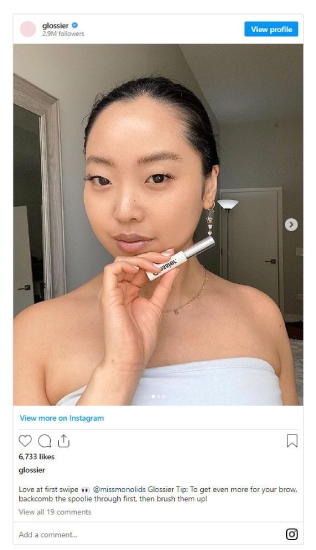
An example of Glossier incorporating real people as micro-influencers into its Instagram marketing (Source: Extole.com)
Partnering with micro-influencers is so effective that even larger businesses use micro-influencer marketing campaigns. A notable example is Glossier, a $400 million cosmetics brand, which sends its products to micro-influencers in different countries. Its word-of-mouth campaigns were so effective that 70% of Glossier’s online traffic and sales came from peer referrals. (Read more about the Glossier influencer marketing strategy at Extole.com.)
4. Run Contests or Giveaways
A common influencer marketing strategy is hosting giveaways or running contests as part of your campaign. This involves providing an influencer with products (or a service) that the influencer can offer to their followers as a giveaway or contest prize. Not only does it help to grow your brand presence, but it also helps the influencer get more engagement.
A good example of this influencer marketing campaign strategy is when Credo Beauty sponsored an Instagram influencer’s birthday giveaway. To join this giveaway, users were tasked to like both the influencer’s and brand’s profile, as well as tag three other users in the comments.
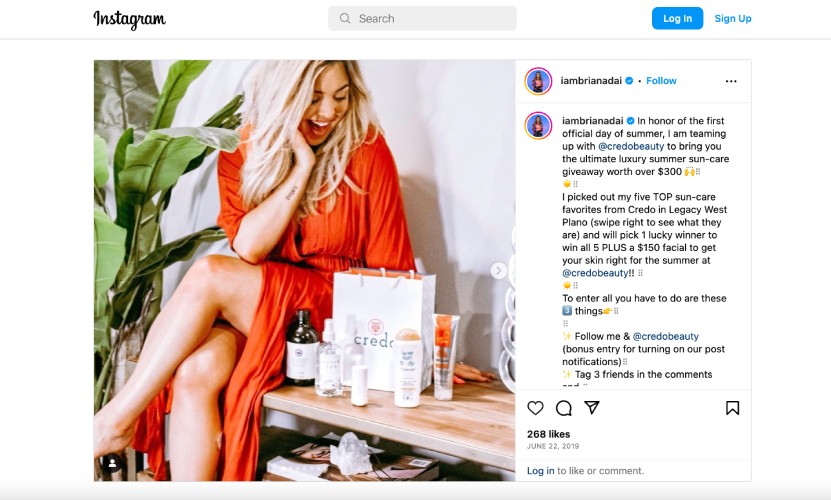
Running contests or giveaways through influencers helps improve visibility. (Source: Instagram)
Running a contest or giveaway with an influencer is straightforward. Add in rules for entry to the giveaway such as:
- Follow the influencer to improve future reach
- Follow your brand to improve brand visibility
- Comment on the post to boost engagement
- Tag a specific number of friends on the post to encourage more participation
- Use a hashtag to improve content reach
5. Explore Affiliate Marketing With Influencers
Traditional affiliate marketing is when bloggers or publishers promote or review brands online, often for some type of commission. On the other hand, influencer affiliate marketers not only personally demonstrate the products, but they also give their testimonial and call to action in a single video, leading people down the sales funnel in a shorter amount of time.
For example, a TikTok affiliate influencer can release a short video showing them using a product, explain why it’s a good choice, and urge people to purchase it—all in an authentic way. People can search for these videos specifically, but they can also encounter the videos by organically scrolling through social feeds. This makes the product more visible and makes the sales process more organic, in turn, making your brand look desirable and credible.
The examples of influencer affiliate marketing below are from Instagram stories of micro-influencers. These use both content from the brand and of the influencer personally using the promoted product. By including their affiliate link in the story, they encourage their viewers to purchase the promoted items.
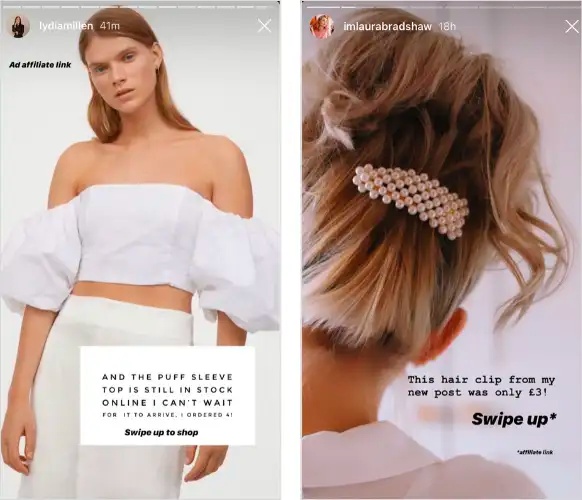
Influencer affiliate marketing helps amplify marketing efforts and sales. (Source: Later)
Want more ways to power your social media efforts? Explore these social media marketing tools to strengthen your campaigns.
Types of Influencers & Average Cost
The price for social media influencer marketing varies widely, depending on factors like the influencer’s audience size, celebrity status, and scope of the campaign. Influencer Marketing Hub published the average costs of influencer-generated content depending on the social media platform, which we’ve summarized below:
Type of Influencer | # of Followers | Cost on Instagram | Cost on TikTok | Cost on Facebook |
|---|---|---|---|---|
Nano-influencers | 1,000-10,000 | $10-$100 | $5-$25 | $25-$250 |
Micro-influencers | 10,000-50,000 | $100-$500 | $25-$125 | $250-$1,250 |
Mid-tier Influencers | 50,000-500,000 | $500-$5,000 | $125-$1,250 | $1,250-$12,500 |
Macro-influencers | 500,000-1M | $5,000-$10,000 | $1,250-$2,500 | $12,500-$25,00 |
Mega-influencers | 1M+ | $10,000+ | $2,500+ | $25,000+ |
Not sure how to find influencers on a small budget? Try Fiverr. You’ll be able to find nano- and micro-influencers to help tout your brand online.
Benefits of Influencer Marketing Campaigns for Small Businesses
Influencer campaigns are beneficial in improving brand awareness, engagement and interaction, and sales—often at a relatively low cost. In fact, 82% of marketers believe that the quality of customers from influencer marketing campaigns is better compared to other marketing types.
With that in mind, here are some of the main benefits of influencer campaigns for startups and small businesses:
- Brand credibility: Influencers have built trust with their followers through authentic content. Their endorsement lends credibility to your brand. In fact, 81% of consumers researched or considered purchasing a product after seeing an influencer post about it.
- Content variety: Influencers create diverse and engaging content, offering a fresh perspective on your products or services. This can include high-quality visuals, videos, and even instructional clips, which 42% of people favor as far as content formats.
- Search visibility: A lesser-known benefit of influencer collaborations is that it can lead to backlinks and mentions from reputable websites, in turn contributing to your search engine optimization (SEO) efforts. Getting backlinks from high-authority sites improves your website’s visibility in online searches and boosts the authority score of your domain.
- Faster results: Compared to building an organic following from scratch, influencer marketing can grow your brand faster since it takes advantage of an influencer’s already existing reach. This effect can be sped up even more, considering that 77% of surveyed marketers believe that influencer marketing can be automated.
- Trend relevance: Part of an influencer’s responsibility is keeping up with trends. Partnering with them keeps your brand relevant and attuned to the latest shifts in your industry.
- Brand authenticity: Traditional marketing and paid social ads can feel like hype. On the other hand, influencers can present your brand in a more accessible way, especially when they come off as “real people” interacting with your brand in the real world.
Influencer Marketing Frequently Asked Questions (FAQs)
What is influencer marketing?
Influencer marketing is a marketing strategy that involves collaborations between brands and people who have a significant online presence, known as influencers. This form of marketing taps into the influencer’s reach and engagement with their existing audience. Influencer marketing can occur on different platforms, but most notably on TikTok, Instagram, Facebook, and YouTube.
Is TikTok influencer marketing worth it for small businesses?
TikTok is one of the biggest yet most affordable channels for influencer marketing—so it is worth trying for small businesses. However, it is important to note that most of its user base is from younger generations, and it is more effective for business-to-consumer marketing compared to business-to-business marketing.
How to get influencers to promote your product?
Offering a fixed rate for compensation, gifting products, and sending a message for a potential collaboration are common ways to get influencers to promote your product. It also helps to make sure that your product is relevant to the influencer and that you approach the situation professionally with upfront value for them.
Bottom Line
Influencer marketing can help small businesses promote their products or services to a wider and more engaged audience at a reasonable cost. There are a number of influencer strategies worth looking into. A few examples include product endorsements, reflecting brand values, and influencer affiliate marketing. With the right strategies, brands can craft a successful influencer marketing campaign that brings in quality customers.